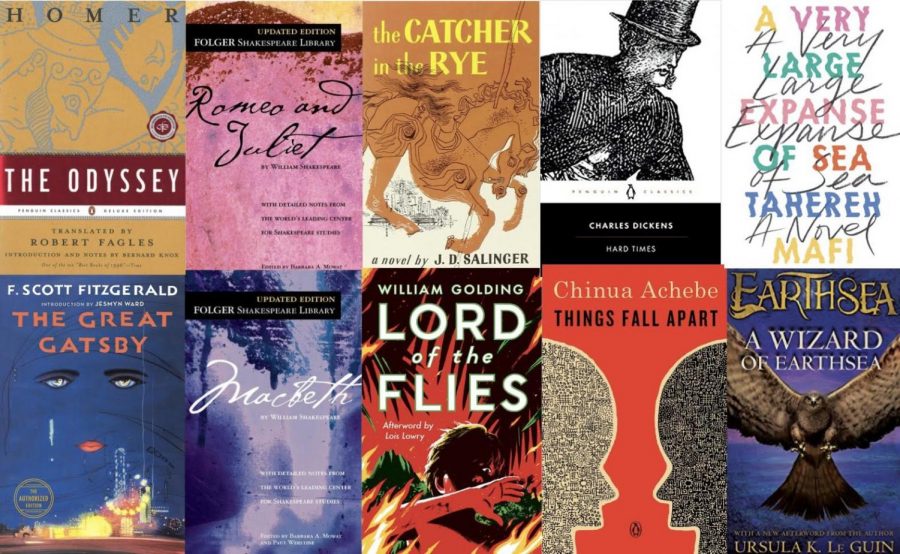A high school burden or a lifelong love?
The books read in English courses should prioritize promoting an enjoyment of reading.
Above are a few the titles that many English courses require their students to read, including classics like Romeo and Juliet and The Great Gatsby.
Every year, students come into the first day of school, sit down in their English class, and receive a syllabus. Beyond offering the guidelines for academic integrity and typical classroom rules, the syllabus gives students a view of the books they will be required to read throughout the year.
With absolutely no choice, students are subject to these lists, expected to spend hours reading and annotating books that they potentially have no interest in or do not relate to.
Instead, there should be some degree of choice in English classes when it comes to establishing the required reading list for the year.
In my time at New Trier, my English classes have consisted of a lot of classics: the work of F. Scott Fitzgerald, William Shakespeare, Charles Dickens, and Homer. Though English classes have included some contemporary literature, teachers have required that students thoroughly analyze the work, dissecting, what seems like, every syntax, every word choice, every tonal decision.
Personally, I’ve found that some of the English courses I’ve taken are marked by the burden of analyzing unrelatable, dense text after unrelatable, dense text.
I can definitely appreciate the craft of world-renowned, often white authors and how they so meticulously craft a story that seamlessly flows while also holding symbols and layers for deeper meaning.
But, I can only take so many of these stories, especially when there is so much diversity out there in material.
I propose that the English curriculum shifts to more of a balance between including the classic literary works as well as more contemporary books that students would opt to read outside of the classroom.
Teachers should conduct a survey at the beginning of the year with a set list of books written for young adults that students could choose from for the impending school year.
This would combine establishing the critical analysis skills necessary for higher education and working in the professional world in addition to, hopefully, instilling in students the joy that can be brought about by getting lost in a story and exposing them to valuable stories and lessons.
Currently, I’m in a reading phase and loving it: reading book
after book with little to no breaks in between. It has illustrated to me the fun that can be reading as well as the intellectual stimulation.
For much of my life, I averted any type of recreational reading as a way “to spare my mind from the intellectual exhaustion that reading brings.” However, I naively crafted this perception; after almost solely reading dense books in school and having to thoroughly annotate them, I thought reading could never be something I’d do when left to my own devices.
According to the Washington Post, the percentage of Americans who read for pleasure on a typical day was at an all-time low, as of 2018. There was a 30% decline since 2004 said a survey conducted by the Bureau of Labor Statistics.
Research from Pew Research Center and Gallup has shown that the number of adults not reading any book in a given year tripled between 1978 and 2014.
Despite this downward trend, reading has so much to offer its participants. It increases one’s vocabulary, promotes empathy, reduces stress, and prevents cognitive decline. And reading can be a fun, engaging outlet for relaxation that doesn’t entail looking at a screen which leads to a whole bevy of issues in itself.
So, beyond teaching us how to point out the eye motif in The Great Gatsby or identify the symbolism in The Lord of the Flies, English courses should strive to foster a lifelong desire to read for pleasure.
Books have much to teach us: different cultures, unique communities, deep emotions, profound lessons. Students’ education doesn’t stop once they depart New Trier or graduate from some institution of higher education, but education is in a sense less accessible to us.
Instead of walking into a classroom with learning opportunities at every corner, adulthood will leave students as the teachers of their own education, and it is too easy to elect to do a mindless activity of no intellectual benefit.
But, if teachers show students that reading can be enjoyed and not just an element to include in literary analyses, they can truly foster a student body that could effectively go out into the world as active listeners and observers of the world around them and all the stories it has to offer.
Looking for quick, fun reads? Check out The Seven Husbands of Evelyn Hugo by Taylor Jenkins Reid, People We Meet on Vacation by Emily Henry, Interior Chinatown by Charles Yu, or When No One Is Watching by Alyssa Cole.







































